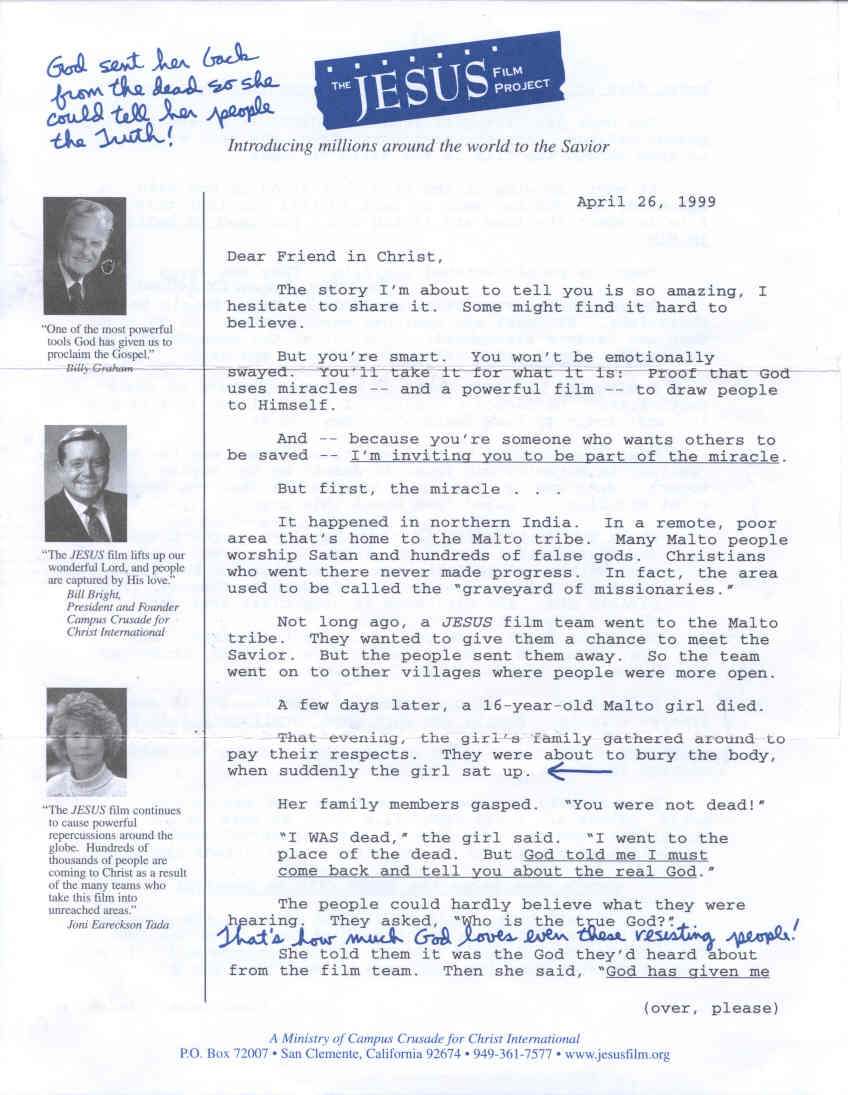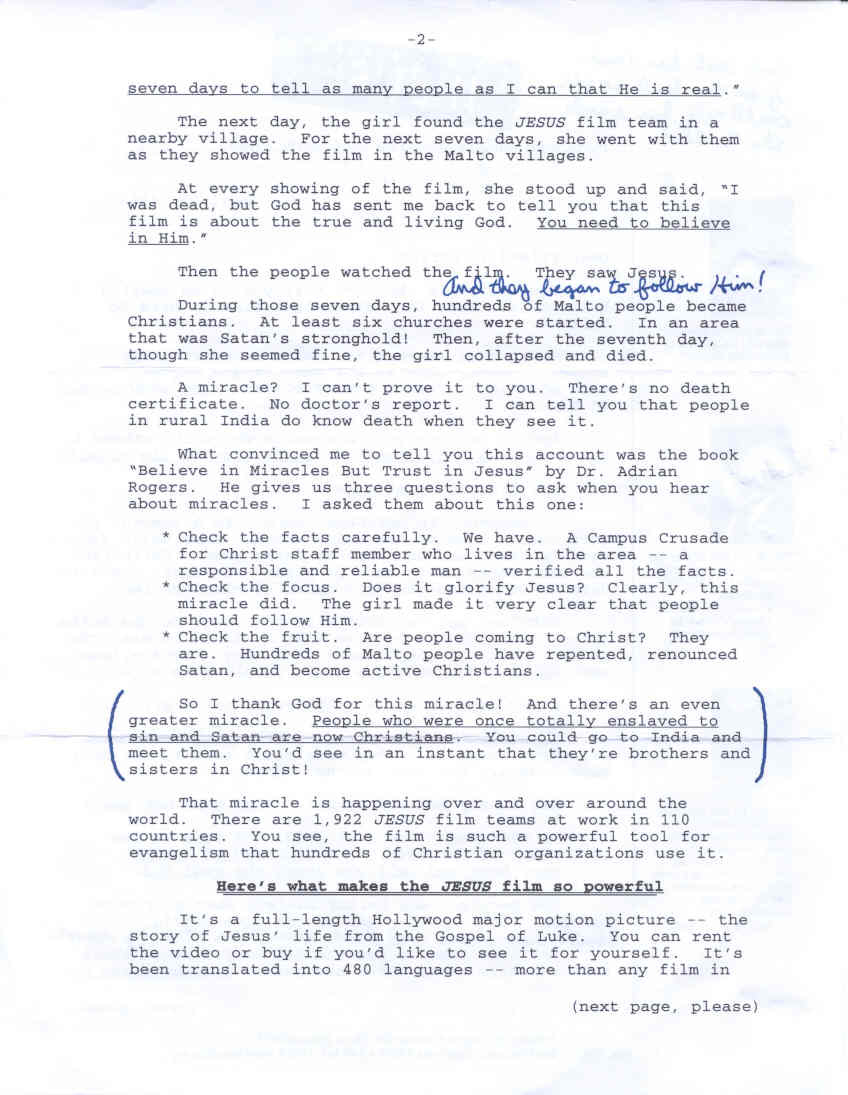But he said to him, ‘If they do not listen to Moses and the Prophets, they will not be persuaded even if someone rises from the dead.’” - Luke 16:31
With many of the discussions swirling around some recent, highly-publicized religious events, my mind has gotten to churning about what makes Christians believe something is from God and how we differentiate between the real and the fake. Scripture warns many times over that false teachers and prophets will arise (Mt. 7:15-23, 24:11, 24; Acts 20:29-31; 2 Pet. 2; 1 Jn. 4:1-6, and many more) that people will chase after them, that people will seek experience, and that, if it was possible, even the elect would be deceived (Mt. 24:24). How do we avoid being deceived or drawn away after that which is not of God?
To illustrate a reason why many tend to be deceived, I will share here images, the first two pages of a letter I received from The Jesus Film Project in 1999. This letter describes a purported miraculous event and then lays out some criteria for determining whether it was truly a miracle:
If you read the story in this letter, you understand that Christians sought to evangelize the Malto tribe of northern India but had no success among these people who worshipped false gods and Satan. The Jesus Film Project also attempted to reach them with their film, but they too were turned away.
Then one of the Malto’s own children died. As there had yet been no success with preaching the gospel, this teen would presumably have been unsaved. When the family gathered that evening to bury her, the girl revived. At that time, she claimed she had gone to “the place of the dead,” but that God sent her back, with a seven-day time limit, to tell as many people as she could about Him. She then found the people of the Jesus Film Project and traveled with them to evangelize the Malto villages.
Now, having no evidence to prove this miracle, the letter offers the reader three “questions”, which they attribute to Adrian Rogers, to ascertain if a miracle is real:
* Check the facts carefully. We have. A Campus Crusade for Christ staff member who lives in the area -- a responsible and reliable man — verified all the facts.
* Check the focus. Does it glorify Jesus? Clearly, this miracle did. The girl made it very clear that people should follow Him.
* Check the fruit. Are people coming to Christ? They are. Hundreds of Malto people have repented, renounced Satan, and become active Christians.
Do these three questions hold up? Was this, in fact, the miracle the letter claims it to be? They give answers that they assert confirm the legitimacy, but there is one criterion glaringly absent from this list of questions: Check the Scriptures. Does the event align with what God has revealed in His word?
In Luke, Jesus relates an interesting story:
“Now there was a rich man, and he habitually dressed in purple and fine linen, joyously living in splendor every day. And a poor man named Lazarus was laid at his gate, covered with sores, and longing to be fed with the crumbs which were falling from the rich man’s table; besides, even the dogs were coming and licking his sores. Now the poor man died and was carried away by the angels to Abraham’s bosom; and the rich man also died and was buried. In Hades he lifted up his eyes, being in torment, and *saw Abraham far away and Lazarus in his bosom…And he said, ‘Then I beg you, father, that you send him to my father’s house— for I have five brothers—in order that he may warn them, so that they will not also come to this place of torment.’ But Abraham *said, ‘They have Moses and the Prophets; let them hear them.’ But he said, ‘No, father Abraham, but if someone goes to them from the dead, they will repent!’ But he said to him, ‘If they do not listen to Moses and the Prophets, they will not be persuaded even if someone rises from the dead.’”
Luke 16:19-31
Here, the rich man agonizing in, as the Malto girl termed the place she visited, “the place of the dead” (after all, like the girl, he too was unsaved), asks Abraham to send Lazarus to his brothers so that they will not end up in the same torment. Abraham refuses stating that the rich man’s brothers “have Moses and the Prophets”, and that if they will not believe what God has already revealed, they will not believe “even if someone rises from the dead.” This should cause us to question, will God send someone back from the dead to preach the gospel? If He did, would He send an unbeliever back, when here he would not even send back someone who was saved? Clearly not.
While the letter asserts that all the necessary benchmarks were met, no one attempted to validate it by Scripture. Why? Why would Christians, instead of seeking the guidance God has already provided, rely on subjective measures to decide if something is truly from God?
In Matthew 4, Satan tempted Jesus three times, and setting an example for us, Jesus responded each time, “it is written.” Even being God Himself, Jesus turned to Scripture as the authority. Jesus is not the only one who provides such example. The apostle Paul wrote:
All Scripture is inspired by God and profitable for teaching, for reproof, for correction, for training in righteousness; so that the man of God may be adequate, equipped for every good work.
2 Tim. 3:16-17
This same apostle also exhorts us:
Now these things, brethren, I have figuratively applied to myself and Apollos for your sakes, so that in us you may learn not to exceed what is written, so that no one of you will become arrogant in behalf of one against the other.
1 Cor. 4:6 (emphasis mine)
Paul beseeches us, do not go beyond Scripture. Scripture is the only measuring rod by which we can responsibly and reliably assess any movement or experience. Too many people get this turned around and want to interpret Scripture based on their experience or their emotions. It is these same people who balk at, or call Pharisees, those who would use Scripture as a gauge. Yet for this same behavior, Scripture commends the Bereans:
The brethren immediately sent Paul and Silas away by night to Berea, and when they arrived, they went into the synagogue of the Jews. Now these were more noble-minded than those in Thessalonica, for they received the word with great eagerness, examining the Scriptures daily to see whether these things were so.
Acts 17:10-11
Why were the Bereans considered noble-minded? Not because they checked Paul’s facts, questioned whether Paul was focused on Christ, nor whether Paul was bearing fruit. They were considered noble-minded because they checked Paul against Scripture.
Some might say, “If people are coming to Jesus, what does it matter? After all, the Bible says:
Some, to be sure, are preaching Christ even from envy and strife, but some also from good will; the latter do it out of love, knowing that I am appointed for the defense of the gospel; the former proclaim Christ out of selfish ambition rather than from pure motives, thinking to cause me distress in my imprisonment. What then? Only that in every way, whether in pretense or in truth, Christ is proclaimed; and in this I rejoice."
Phil. 1:15-18
This is true - as long as Christ was preached, Paul didn’t care the motive of the person preaching. The problem is, motive is all that this passage addresses; it does not address content. While the motives were impure, the true Jesus and true God were preached. This is what Paul desired. When we attribute to God that which does not come from God, as does the letter in chronicling the miracle, we are lying about God. In this case, are people coming to the real Jesus? This is not something to be taken lightly.
People regularly, whether intentionally or not, remake God into an idol of their own creation. It is not uncommon for people to overemphasize one of God's attributes over others, or completely ignore or discard attributes of His that don't fit their own perception or preference of how God should act or who God should be. This then becomes a matter of creating and preaching a false god. We cannot truly preach Christ by supporting the gospel with lies about God. This is why we must test our experiences.
It is easy to surrender to experientialism. We serve a God whose miraculous signs are abundantly documented in the Bible. It is natural that we should long to see the same, and that when something appears divine in its origin, we would want to attribute it to God. The verses in which Jesus warns of false teachers and prophets tell us these will also generate false manifestations. Therefore, we cannot simply “check the facts,” “check the focus,” and “check the fruit.” We cannot trust our emotions, for “the heart is more deceitful than all else” (Jer. 17:9). We must have a purely objective standard, and that standard is Scripture. Our experiences must align with God’s revealed word. If they do not, we are compelled to question them. We cannot judge Scripture by our experiences, but rather, we must judge our experiences by Scripture. If we do not, we might be “carried away by the error of unprincipled men and fall from [our] own steadfastness” (2 Pet. 3:17b). Let us instead, as Paul encouraged, “examine everything carefully; hold fast to that which is good; abstain from every form of evil” (1 Thes. 5:21). How do we examine everything? By searching the Scriptures, as did the Bereans.







As always, you make me think about things from a different angle than where my deceitful heart goes when I hear of something like this. Thanks for a different perspective Chad!
Chad, Yes, your story really made think and to look at the story in a very different light! Even with Dr Graham and Joni E Tada’s affirmations we still need to remember that God gave us ALL the answers we need in His word alone. Thank you for your discernment!